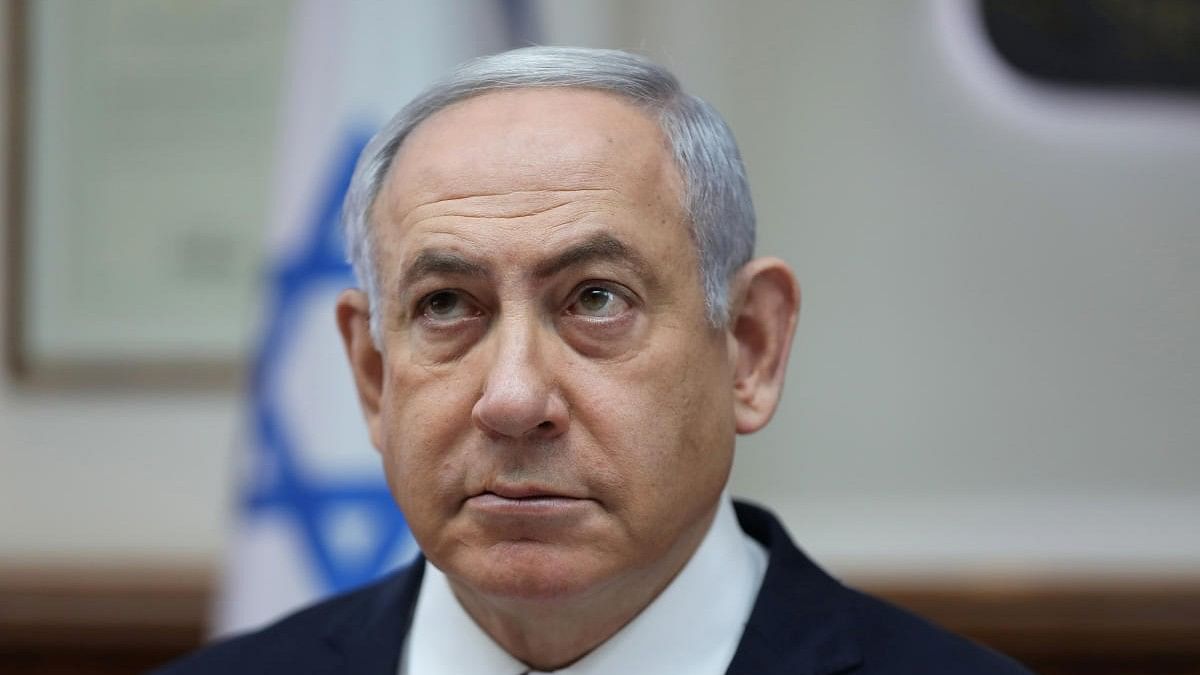
Israeli Prime Minister Benjamin Netanyahu.
Credit: Reuters Photo
Palestinian Islamist group Hamas launched the biggest attack on Israel in years on Saturday, killing at least 100 people and claiming it had taken dozens of hostages in a surprise assault combining gunmen crossing into Israel and a barrage of rockets fired from Gaza.\
Israel said the Iran-backed group had declared war as its army confirmed fighting with militants in several Israeli towns and military bases near Gaza, and Prime Minister Benjamin Netanyahu vowed to retaliate.
"Our enemy will pay a price the type of which it has never known," he said. "We are in a war and we will win it".
Israel's N12 News reported that at least 100 Israelis were killed. A Reuters photographer saw multiple bodies lying in streets of the southern town of Sderot.
The Israeli military said it had responded with air strikes into Gaza, where witnesses reported hearing heavy explosions and multiple dead and wounded being carried into hospitals. The Israeli military said navy forces killed dozens of Palestinian militants trying to infiltrate Israel by sea.
Hamas deputy chief Saleh al-Arouri told Al Jazeera that the group was holding a big number of Israeli captives, including senior officials. He said Hamas had enough captives to make Israel free all Palestinians in its jails.
Gaza health officials said 198 Palestinians had been killed in air strikes as bombardments hit deep into Gaza City, sending clouds of black smoke spiralling into the sky.
Hamas said the attack was driven by what it said were Israel's escalated attacks on Palestinians in the West Bank, Jerusalem and against Palestinians in Israeli prisons.
"This is the day of the greatest battle to end the last occupation on earth," Hamas military commander Mohammad Deif said, announcing the start of the operation in a broadcast on Hamas media and calling on Palestinians everywhere to fight.
Hamas advocates Israel's destruction
The attack marked an unprecedented infiltration into Israel by an unknown number of Hamas gunmen crossing from the Gaza Strip, and the heaviest blow for Israel in the conflict with Palestinians since the suicide bombings of the Second Intifada some two decades ago.
Israel and Hamas fought a 10-day war in 2021. The bloodshed came a day after Israel marked the 50th anniversary of the 1973 war that brought the country to the verge of catastrophic defeat in a surprise attack by Syria and Egypt.
Gun battles in Israeli towns
The militant Islamic Jihad group said it had joined the attacks and was holding several Israeli soldiers captive.
Hamas footage on its Telegram account showed its fighters pulling Israeli soldiers out of a tank.
The Israeli military has declined to comment, saying it would address the reports of Israeli captives later.
Israeli media reported gunbattles between bands of Palestinian fighters and security forces in towns in southern Israel. Israel's police chief said there were "21 active scenes" in southern Israel.
In Gaza, people rushed to buy supplies in anticipation of days of conflict ahead. Some evacuated their homes and headed for shelters.
UN Middle East peace envoy Tor Wennesland condemned the attacks on Israel, warning in a statement: "This is a dangerous precipice, and I appeal to all to pull back from the brink."
The violence also drew criticism from Washington and other Western capitals.
"The United States unequivocally condemns the unprovoked attacks by Hamas terrorists against Israeli civilians. There is never any justification for terrorism," said White House National Security Council Spokesperson Adrienne Watson.
'Please send help'
Speaking to N12 News by phone from Nir Oz, a kibbutz near Gaza, a woman identified as Dorin said militants had infiltrated her house and tried to open the bomb shelter where she was hiding.
"They just came in again, please send help," she said. "There are a lot of homes harmed ... My husband is holding the door closed ... They are firing rounds of bullets."
Israeli Defence Minister Gallant said "troops are fighting against the enemy at every location" and authorised the call-up of reservists.
Footage circulating on social media appeared to show clashes in city streets as well as gunmen in jeeps roaming the countryside.
"We were told there are terrorists inside the kibbutz, we can hear gunfire," a young woman named Dvir, from Beeri Kibbutz, told Israeli Army Radio from her bomb shelter.
Backdrop of surging violence
The escalation comes against a backdrop of surging violence between Israel and Palestinian militants in the West Bank, which together with the Gaza Strip is part of the territories where Palestinians have long sought to establish a state.
It also comes at a time of political upheaval in Israel, which has been riven by deep divisions over moves to overhaul the judiciary, and as Washington works to strike a deal that would normalise ties between Israel and Saudi Arabia.
Saudi Arabia's foreign ministry called for an "immediate cessation of violence between Israeli and the Palestinians", the state news agency reported.
The Iran-backed Lebanese group Hezbollah said the operation was a "decisive response to Israel's continued occupation and a message to those seeking normalisation with Israel".
An adviser to Iran's Supreme Leader Ali Khamenei congratulated Palestinian fighters for the attack.
Hamas media displayed videos of what it said were bodies of Israeli soldiers brought into Gaza by fighters, and Palestinian gunmen inside Israeli homes and touring an Israeli town in jeeps reportedly been driven into Israel by the attackers.
Reuters was not immediately able to verify the footage. Hamas media also circulated video footage apparently showing a destroyed Israeli tank.
In Gaza, the roar of rocket launches could be heard and residents reported armed clashes along the separation fence with Israel, near the southern town of Khan Younis, and said they had seen significant movement of armed fighters.
Palestinians in Gaza were bracing for Israel's response.
"We are afraid," Palestinian woman, Amal Abu Daqqa, told Reuters as she left her house in Khan Younis.